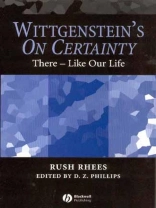Rush Rhees, a close friend of Wittgenstein and a major interpreter of his work, shows how Wittgenstein’s On Certainty concerns logic, language, and reality – topics that occupied Wittgenstein since early in his career.
- Authoritative interpretation of Wittgenstein’s last great work, On Certainty, by one of his closest friends.
- Debunks misconceptions about Wittgenstein’s On Certainty and shows that it is an essay on logic.
- Exposes the continuity in Wittgenstein’s thought, and the radical character of his conclusions.
- Contains a substantial and illuminating afterword discussing current scholarship surrounding On Certainty, and its relationship to Rhees’s work on this subject.
Table of Content
Preface vii
PART I THE PHILOSOPHICAL BACKGROUND TO ON CERTAINTY 1
1 On Certainty: A New Topic? 3
2 Saying and Describing 6
3 Concept-Formation 11
4 ‘Seeing’ and ‘Thinking’ 16
5 Thought and Language 27
6 Picturing Reality 34
7 What Makes Language Language? 40
8 The Logical and the Empirical 44
9 On Certainty: A Work in Logic 48
PART II DISCUSSIONS OF ON CERTAINTY 53
10 Two Conversations with Wittgenstein on Moore 55
11 Preface to On Certainty 61
12 On Certainty’s Main Theme 67
13 Induction 73
14 Wittgenstein’s Propositions and Foundations 78
15 Language as Emerging from Instinctive Behaviour 93
16 Words and Things 106
17 Not Worth Mentioning? 111
18 Certainty and Madness 118
PREFACE
Appendix 1: Comparisons Between On Certainty and Wittgenstein’s Earlier Work 125
Appendix 2: Some Passages Relating to Doubt and Certainty in On Certainty 131
Afterword: Rhees on Reading On Certainty 133
D. Z. Phillips
Notes 183
Index 192
About the author
Rush Rhees (1905–89) was one of Wittgenstein’s closest friends and his literary executor. He taught at Swansea from 1940 to 1966. Amongst Wittgenstein’s posthumous works edited by Rhees are Remarks on the Foundations of Mathematics (1956), Blue and Brown Books (1958), Philosophical Remarks (1964), Lecture On Ethics (1965) and Philosophical Grammar (1969). Rhees is also the author of Discussions of Wittgenstein (1970, 1996) and Wittgenstein and the Possibility of Discourse (1998).
D. Z. Phillips is Professor of Philosophy Emeritus and Rush Rhees Professor Emeritus at the University of Wales, Swansea, and Danworth Professor of the Philosophy of Religion at Claremont Graduate School, California. He has published widely in the philosophy of religion and ethics; some of his more recent books include Interventions in Ethics (1992), Wittgenstein and Religion (1993) and Religion and the Hermeneutics of Contemplation (2001). He is also editor of the Blackwell journal Philosophical Investigations.












